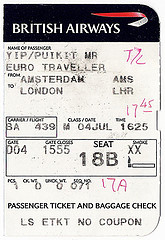For student travelers, going away from home can be exciting as well as challenging. When they are on their own, things can certainly get exciting, but when they are confronted with problems, sometimes, the situation can be quite challenging. In any case, here are some useful important things that all student travelers need to know.
Whether traveling to attend school in another place or backpacking in a remote country, students are entitled to special discounts in most countries. For instance, holders of the International Student Identity Card stand to enjoy more than 40,000 discounts across 120 countries. Some of these benefits include: discounts on travel, accommodations, food, entertainment, and shopping. Application is easy and fast.
Since most students are young and restless, they tend to subscribe to the idea that they are immune to illnesses or accidents. Student travelers have to know that unfortunate things can also happen to the smartest and strongest people so it’s best to be prepared. One of the best ways to protect themselves is to buy a suitable travel insurance policy. In fact, students can find cheap travel insurance quite easily. It’s a small price to pay to ensure a worry-free trip.
Students who are traveling to a foreign country are advised to find out the contact information of: the embassy, local hospitals, local police stations, and more. When a situation arises, it’s always good to have all the telephone numbers and addresses ready. Student travelers would also be wise to learn about the local customs to understand the differences and most importantly, respect them. Not restricted to students, some travelers can get so disorientated by culture shock that they are not able to adjust and adapt, suffering as a result of their short-sightedness or stubborn nature. To this end, it’s always best to follow the old time maxim which says, “When in Rome, do as the Romans do.â€
When students travel, they have a lot of opportunities to make new friends, and it’s not uncommon that some of them develop lifelong friendships with other travelers or locals. Unsurprisingly, some student travelers even meet their spouses during their trips. While it’s always a good idea to keep an open door if not a window in this aspect, it’s also wise to practice caution. Just as there are well-meaning folks who want to show their good side, there are also well-disguised crooks waiting to prey on student travelers just because they are generally greener. Well, there are no hard and fast rules on the matter: It’s the instinct that has to be sharper. When you feel uncomfortable about something, it’s time to retreat. Learn to see through all the smoke screens to unveil the core motives.
Today, student travelers have greater and cheaper opportunities to explore many countries in the world. As such, they have to practice good conduct and discretion to make the most of their travels.

 Traveling is a fun and educational activity for students, because it gives them the opportunity to discover new lands and cultures, and enhance their understanding of the world. More and more students are traveling abroad these days, and some are even going on backpacking trips to lesser known countries. There are also students who travel to foreign countries to study or take part in exchange programs. While making travel plans, students should take into consideration the need for travel insurance. A travel insurance policy will provide compensation for expenses and losses incurred as a result of accidents or other unfortunate events.
Traveling is a fun and educational activity for students, because it gives them the opportunity to discover new lands and cultures, and enhance their understanding of the world. More and more students are traveling abroad these days, and some are even going on backpacking trips to lesser known countries. There are also students who travel to foreign countries to study or take part in exchange programs. While making travel plans, students should take into consideration the need for travel insurance. A travel insurance policy will provide compensation for expenses and losses incurred as a result of accidents or other unfortunate events. For most travelers, looking into travel insurance raises all kinds of questions. What type of insurance will I need? How much will it cost? How much coverage will I really need on a specific policy? In planning for your trip, you need to arrange for accommodations, air tickets, or car rentals some time before actually going on the trip. Most seasoned travelers would have acquired travel insurance as they are making travel arrangements. Still, more people wonder.
For most travelers, looking into travel insurance raises all kinds of questions. What type of insurance will I need? How much will it cost? How much coverage will I really need on a specific policy? In planning for your trip, you need to arrange for accommodations, air tickets, or car rentals some time before actually going on the trip. Most seasoned travelers would have acquired travel insurance as they are making travel arrangements. Still, more people wonder. Whether you are traveling abroad or otherwise, it’s a very good idea to look into your insurance options. Here’s some information on different kinds of travel insurance to help you decide if you need travel insurance.
Whether you are traveling abroad or otherwise, it’s a very good idea to look into your insurance options. Here’s some information on different kinds of travel insurance to help you decide if you need travel insurance. It is not uncommon for travelers to fall ill when they are traveling, because they may have trouble getting used to the food and climate in other countries. Accidents can also happen during travels, especially for those who participate in high-risk activities. Getting medical care for illnesses and injuries can be expensive in some countries, and some foreign hospitals may require advance payment before treatment is administered. One solution to the problem is to get travel medical insurance. With a travel medical insurance, travelers will receive compensation for the medical expenses incurred when they become injured or sick during their trips.
It is not uncommon for travelers to fall ill when they are traveling, because they may have trouble getting used to the food and climate in other countries. Accidents can also happen during travels, especially for those who participate in high-risk activities. Getting medical care for illnesses and injuries can be expensive in some countries, and some foreign hospitals may require advance payment before treatment is administered. One solution to the problem is to get travel medical insurance. With a travel medical insurance, travelers will receive compensation for the medical expenses incurred when they become injured or sick during their trips. These days, there are numerous insurance companies that offer a wide variety of travel insurance policies, and many travelers have trouble finding out which company offers the best policies. One of the best ways to find a good travel insurance policy is to take a look at ratings of travel insurance companies. Usually, a reputable insurance company will provide policies with good coverage and efficient compensation.
These days, there are numerous insurance companies that offer a wide variety of travel insurance policies, and many travelers have trouble finding out which company offers the best policies. One of the best ways to find a good travel insurance policy is to take a look at ratings of travel insurance companies. Usually, a reputable insurance company will provide policies with good coverage and efficient compensation.